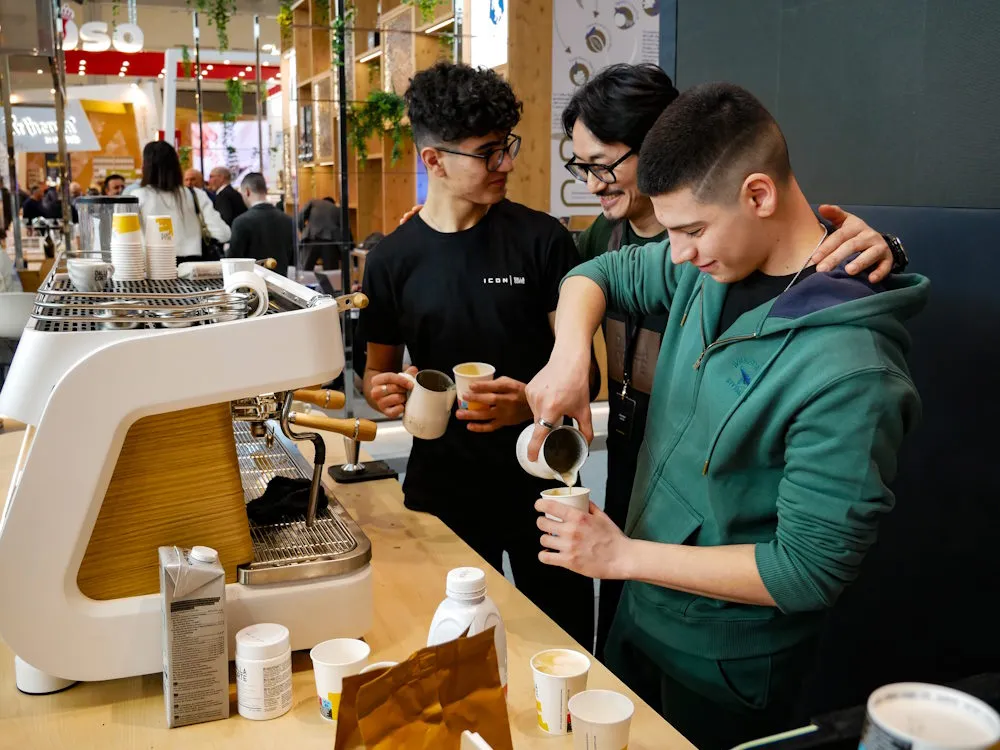In recent years, barista training has gained significant popularity as more coffee enthusiasts seek to master the art of crafting the perfect cup. With an increasing demand for skilled baristas in cafes and coffee shops across the nation, understanding the essentials of barista training not only enhances your coffee-making skills but also opens up new career opportunities. Whether you aspire to work in a bustling café or simply want to elevate your coffee knowledge, exploring various training options can set you on the right path.
Introduction to Barista Training
Barista training equips aspiring coffee professionals with essential skills and knowledge about the world of coffee. This specialized training covers various aspects, from understanding coffee beans to mastering espresso preparation and customer service techniques. Barista training programs vary in duration, content, and delivery methods, allowing individuals to choose an option that best suits their learning style and schedule.
Here’s why barista training is crucial:
- Expertise in Coffee: Gain knowledge about different coffee varieties, brewing methods, and flavor profiles.
- Hands-on Experience: Practical training with industry-standard equipment develops confidence and proficiency.
- Customer Service Skills: Learn how to create meaningful interactions with customers, enhancing their coffee experience.
Barista training not only prepares individuals for immediate job opportunities but also sets the foundation for long-term career growth in the coffee industry. With the rising popularity of specialty coffee, having formal training can significantly enhance employability.
Ultimately, whether one seeks to work in a bustling café or as a mobile barista, engaging in a barista training program can provide the competitive edge needed to thrive in this exciting field. Investing in barista training paves the way for a fulfilling career in a vibrant coffee culture.

Why Get Barista Training?
Investing in barista training significantly enhances your coffee-making skills and opens doors to numerous opportunities in the culinary world. Here are several compelling reasons to consider enrolling in a barista training program:
- Skill Development: Barista training teaches essential techniques, including espresso extraction, milk frothing, and brewing methods. Mastering these skills elevates your coffee game.
- Career Opportunities: The specialty coffee industry continues to grow. By obtaining formal training, you improve your employability in cafes, restaurants, and coffee shops. Many employers prefer candidates with designated barista training, ensuring that you stand out.
- Networking: Barista training programs often connect you with industry professionals and fellow aspiring baristas. Networking can lead to job offers and mentorship opportunities.
- Certification: Completing a barista training course often provides you with a certification, showcasing your dedication and competency to potential employers.
- Passion for Coffee: If you have an affinity for coffee, training deepens your appreciation and understanding of the beverage’s complexities, enhancing your enjoyment.
- Customer Service Skills: Many programs emphasize customer interaction, helping you learn how to provide excellent service while building rapport with patrons, which is crucial in the hospitality industry.
In summary, pursuing barista training equips you with valuable skills while simultaneously fostering your passion for coffee, making you a desirable candidate in this thriving field.
Top Barista Training Schools in the USA
When seeking the best barista training, several institutions in the USA stand out for their comprehensive programs. These schools equip aspiring baristas with essential skills and knowledge about coffee, brewing techniques, and customer service. Here’s a breakdown of some top choices:
| School | Location | Program Length | Certifications Offered |
|---|---|---|---|
| Seattle Barista Academy | Seattle, WA | 1-5 days | Barista Basics, Espresso Mastery |
| Barista Guild of America | Various Locations | Varies (Online/On-site) | Barista Certification |
| Coffee School | Los Angeles, CA | 2-3 days | Barista Certification, latte art |
| Coffee Project | New York, NY | 1-4 weeks | Specialty Coffee Association (SCA) |
Each of these institutions emphasizes hands-on training and practical experience.
Why Choose These Schools?
- Expert Instructors: Learn from industry experts who provide insights that textbooks can’t.
- Quality Curriculum: Programs cover everything from coffee origins to machine maintenance and flavor profiling.
- Networking Opportunities: Connect with fellow coffee enthusiasts and industry professionals, opening doors for future employment.
Investing time in a reputable barista training program can significantly elevate your skills and enhance your career prospects in the coffee industry. These options reflect the varied approaches to barista training, making it easier to find a fit based on your needs and location.
Online Barista Training Programs
In today’s fast-paced world, online barista training programs provide a flexible and accessible way to acquire essential coffee-making skills. These programs cater to various learning styles and schedules, allowing aspiring baristas to learn at their own pace. Here’s what you can expect from online barista training:
- Comprehensive Curriculum: Most online programs cover a variety of topics including espresso preparation, milk frothing techniques, and coffee bean selection. This ensures a well-rounded education in coffee artistry and customer service.
- Interactive Learning: Engaging video tutorials, live demonstrations, and quizzes enhance the learning experience. Many platforms also offer forums for discussions, helping students connect and collaborate.
- Certifications: Upon completion, participants usually receive a certification that can boost job prospects. This credential validates your skills in a competitive job market.
Comparison Table: Online vs. In-Person Barista Training
| Feature | Online Barista Training | In-Person Barista Training |
|---|---|---|
| Flexibility | High | Limited schedule |
| Interaction | Forums and online chats | Hands-on practice |
| Cost | Generally lower | Higher due to facility costs |
| Certification Opportunities | Yes | Often included |
| Networking Opportunities | Moderate | High (direct interaction) |
With various options available, online barista training meets the demands of modern learners, making it a practical choice for those eager to begin their journey in the coffee industry. Whether you are a beginner or seeking to refine your skills, these programs can provide the foundation needed for a successful barista career.

Barista Training Workshops and Certifications
Barista training workshops and certifications provide an excellent opportunity for both aspiring baristas and those looking to refine their skills. These hands-on programs focus on practical experience and can significantly enhance your coffee-making abilities. Here are some key benefits:
- Intensive Learning: Workshops often last only a few days but pack in a wealth of information and practice. Participants can expect to learn:
- Espresso extraction techniques
- latte art fundamentals
- equipment maintenance and cleaning
- customer service skills
- Certification Options: Many workshops offer certifications that can boost your employability. Completing a recognized certification program can demonstrate your commitment and knowledge in the coffee industry.
- Networking Opportunities: Attending workshops allows you to connect with industry professionals, fellow coffee enthusiasts, and potential employers. These relationships can lead to mentorship and job opportunities.
Comparison of Barista Training Formats
| Training Format | Duration | Cost Range | Certification Available |
|---|---|---|---|
| Workshops | 1-5 days | $200 – $800 | Yes |
| Online Programs | Self-paced (varies) | $100 – $500 | Yes |
| In-person Classes | 2-6 weeks | $600 – $1,500 | Yes |
In conclusion, barista training workshops and certifications provide invaluable skills and open doors in the coffee industry. The practical knowledge gained through barista training workshops can set you up for a successful café career.
The Role of Specialty Coffee Associations
Specialty Coffee Associations (SCAs) play a vital role in the barista training landscape, providing essential resources for aspiring baristas. These organizations focus on promoting high-quality coffee and improving the skills of coffee professionals through structured learning experiences. Here’s how they contribute to barista training:
- Certification Programs: SCAs offer various levels of certifications, which are recognized across the coffee industry. These certifications enhance a barista’s credibility and employability. Programs range from basic brewing techniques to advanced sensory evaluation.
- Workshops and Events: Many SCAs organize workshops and events that provide hands-on experience. Attending these events allows aspiring baristas to learn directly from industry experts, network with peers, and stay up-to-date with current trends.
- Educational Resources: SCAs provide valuable teaching materials, study guides, and online courses specific to barista training. This wealth of knowledge can help baristas refine their craft and understand the complexities of coffee preparation and customer service.
- Supportive Community: Being part of a specialty coffee association connects baristas to a community passionate about coffee excellence. This network fosters mentorship and collaboration, which are crucial for personal and professional growth.
In summary, engaging with Specialty Coffee Associations significantly enhances the value of barista training, offering both structured education and a supportive environment for future coffee professionals.
Mentorship and Apprenticeship Opportunities
Embarking on a barista training journey can lead you to invaluable mentorship and apprenticeship opportunities within the coffee industry. These options not only enhance your skills but also provide a network to jumpstart your career. Here’s why they matter:
- Hands-on Experience: Apprenticeships offer practical experience in real cafés, allowing you to apply what you’ve learned in your barista training program.
- Knowledge Transfer: Mentorship connects you with seasoned baristas who impart nuanced insights that formal training might not cover. This direct guidance can accelerate your learning process.
- Industry Connections: Building relationships with established professionals opens doors to job opportunities and future collaborations.
Types of Mentorship and Apprenticeship
| Type | Description |
|---|---|
| Formal Apprenticeships | Engaging in structured training programs with leading coffee shops. |
| Informal Mentorship | Learning from experienced baristas through casual interactions or workshops. |
| Professional Networks | Joining barista communities or associations to access various mentorship programs. |
By participating in these mentorship and apprenticeship opportunities after your barista training, you can gain a competitive edge in the job market, develop a deep understanding of coffee culture, and refine your skills to meet industry standards. Embrace these avenues to elevate your barista journey and blend passion with profession!
Comparing Costs of Barista Training Programs
Understanding the costs associated with barista training can help aspiring coffee professionals make informed decisions. Costs can vary significantly based on factors such as program length, location, and institution type. Here’s a comparison to guide you:
| Training Method | Average Cost | Duration | Certification |
|---|---|---|---|
| In-Person Courses | $300 – $1,200 | 1 day to 2 weeks | Yes |
| Online Courses | $50 – $500 | Self-paced | Varied |
| Workshops | $100 – $600 | 1 day to 3 days | Yes |
| Formal Culinary Schools | $5,000 – $20,000 | Several months | Yes |
Key Factors Influencing Costs:
- Type of Training: In-person courses often provide hands-on experience but at a higher cost.
- Location: Major cities typically have higher tuition fees due to demand.
- Reputation: Established schools with good reviews may charge more.
While investing in barista training might seem steep initially, remember that quality education can lead to better job opportunities and higher salaries in the long run. Additionally, consider exploring a mix of online and in-person options to balance costs while gaining valuable skills in the barista training arena.
Essential Skills Learned in Barista Training
Barista training equips aspiring coffee professionals with a wide array of skills essential for success in the industry. By enrolling in a barista training program, you will acquire a unique set of competencies that directly enhance your work performance and customer service abilities. Here are some key skills you can expect to learn:
- Espresso Crafting: Mastering the art of pulling the perfect shot of espresso, including grind size, tamping pressure, and extraction time.
- Milk Texturing: Understanding the techniques of steaming and frothing milk to create beautiful microfoam for lattes and cappuccinos.
- Coffee Knowledge: Gaining insight into different coffee beans, brewing methods, and flavor profiles, making you an informed coffee advisor for customers.
- Latte Art: Learning the fundamentals of creating visually stunning designs on coffee beverages that enhance customer experience.
- Equipment Maintenance: Identifying and maintaining espresso machines and grinders, ensuring optimal performance and longevity.
- Customer Service Excellence: Developing communication skills to efficiently engage with customers, take orders, and handle complaints effectively.
- Beverage Menu Creation: Understanding how to design and experiment with new beverages, catering to varying customer preferences.
- Safety and Hygiene Practices: Learning the importance of food safety and cleanliness in a fast-paced café environment.
In summary, barista training not only enhances your coffee-making prowess but also cultivates vital customer service skills and operational knowledge, preparing you for a successful career in the specialty coffee industry.
Post-Training Job Opportunities
Completing a barista training program opens up a variety of exciting career paths in the coffee industry. Here are some key job opportunities that await you after finishing your training:
- Barista: The most common role, where you’ll prepare and serve coffee and espresso beverages in cafes or coffee shops.
- Coffee Shop Manager: With experience, you can transition into management, overseeing staff, operations, and customer service.
- Head Barista: This role involves leading a team of baristas, maintaining specialty coffee standards, and training new staff.
- Coffee Roaster: For those interested in the behind-the-scenes process, becoming a coffee roaster allows you to select and roast beans for retail.
- Coffee Consultant: Use your expertise to help businesses improve their coffee offerings and customer experience.
- Sales Representative: Work with coffee companies to market and sell coffee beans, equipment, or training services.
Additionally, many barista training programs offer networking opportunities with local coffee shops and cafes, making it easier to land interviews post-training.
Key Advantages:
- Hands-on Experience: Many programs include internships, giving you practical skills.
- Certification Recognition: Credible certifications can enhance your resume and impress employers.
With a solid foundation from your barista training, the possibility for career growth is vast. Whether you aim for a creative barista position or an influential role in management, the coffee industry is ripe with opportunities.
Conclusion and Next Steps
In conclusion, pursuing barista training not only equips you with essential skills but also opens doors to exciting career opportunities in the ever-evolving coffee industry. By investing in quality education and practical experiences, you position yourself as a knowledgeable barista capable of crafting exquisite coffee beverages.
Next Steps to Take
To effectively transition from training to employment, consider the following steps:
- Research Local Opportunities: Visit local coffee shops or cafes that align with your passion. Many establishments value trained baristas and may offer job openings.
- Network within the Industry: Attend coffee events, workshops, or trade shows to connect with professionals and discover potential job leads.
- Revise Your Resume: Highlight your barista training experiences, focusing on relevant skills acquired during your training, such as expert brewing techniques or customer service.
- Seek Internships: Look for internships or apprenticeship opportunities to gain hands-on experience while building your resume.
Ultimately, barista training acts as a springboard into a vibrant career. Whether you aim to work in a small local café or a high-end specialty shop, the skills gained through structured training programs will be invaluable. Start your journey today and let your love for coffee blossom!
Frequently Asked Questions
What is barista training, and why is it important?
Barista training is a specialized program designed to educate individuals on the skills and knowledge required to prepare coffee beverages, manage espresso machines, and understand coffee origins and brewing techniques. This training is essential for anyone aspiring to work in coffee shops or cafes, as it ensures they have the necessary expertise to deliver high-quality drinks, offer excellent customer service, and maintain equipment. Additionally, trained baristas can provide accurate information about coffee, enhancing the customer experience.
Where can I find barista training programs in the USA?
Barista training programs can be found in numerous locations across the USA. Many specialty coffee shops, colleges, and culinary schools offer workshops and comprehensive courses. Online platforms also provide virtual training options. Notable organizations such as the Specialty Coffee Association (SCA) and local coffee academies are excellent resources. Websites like Yelp or Google Maps can help you locate nearby training facilities that suit your needs, ranging from beginner to advanced levels.
How long does barista training typically last?
The duration of barista training can vary significantly based on the program chosen. Short workshops may last only a few hours, covering basic skills and techniques, while more in-depth courses might take several days or even weeks. For those pursuing certification through reputable organizations, the training typically includes both theoretical lectures and practical sessions, amounting to about 20 to 40 hours of instruction in total. Participants should choose a program that aligns with their career goals and availability.
What skills will I learn in barista training?
Barista training covers a wide range of skills essential for coffee preparation and customer interactions. Participants will learn about coffee bean varieties, flavor profiles, brewing methods, milk frothing techniques, and how to operate espresso machines. Training also includes customer service skills, how to create latte art, and manage inventory and equipment maintenance. The comprehensive approach ensures that baristas are well-equipped to handle the dynamic environment of coffee shops, ensuring both quality and customer satisfaction.
Are there any certification programs available for aspiring baristas?
Yes, there are several certification programs available for aspiring baristas in the USA. The Specialty Coffee Association (SCA) offers various certifications covering different aspects of coffee preparation, from sensory skills to advanced brewing techniques. Many local coffee schools also provide their own certifications. Obtaining a formal certification can enhance your employability and demonstrate your commitment to the craft of coffee making, setting you apart in a competitive job market.


